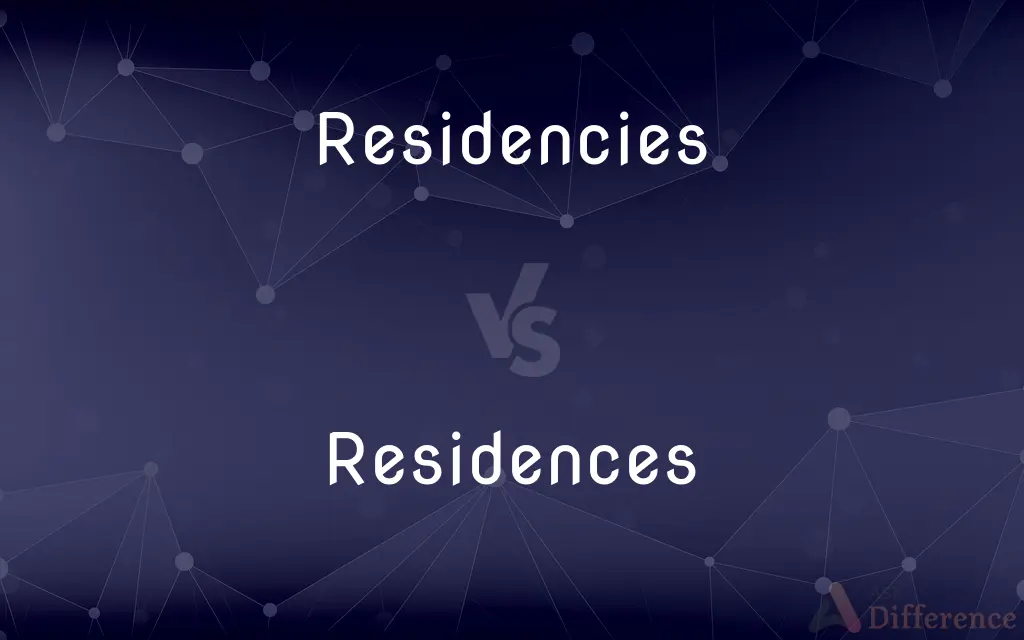Residencies vs. Residences — What's the Difference?
By Maham Liaqat & Fiza Rafique — Updated on March 10, 2024
Residencies often refer to programs providing training in a specific profession, whereas residences denote places where people live or stay.

Difference Between Residencies and Residences
Table of Contents
ADVERTISEMENT
Key Differences
Residencies are structured programs designed for graduates, primarily in the medical field, to gain practical experience under supervision. These programs are critical for professional development and certification. On the other hand, residences refer to buildings or spaces where individuals or families reside. These can range from houses to apartments, serving as the primary living spaces for people.
While residencies are characterized by their educational and professional nature, focusing on learning and skill acquisition in a real-world environment, residences emphasize physical space and personal use. Residences provide comfort, privacy, and personal space, which are essential for daily living.
Residencies usually have a fixed duration, typically ranging from three to seven years, depending on the field of study and the specific requirements of the program. In contrast, the duration of residence in a particular location can vary greatly depending on personal circumstances, lease agreements, or ownership.
The application process for residencies is highly competitive and requires evidence of academic achievement and potential for success in the field. Whereas, securing a residence often involves financial transactions, such as purchasing or renting, and is primarily based on personal or family needs.
Residencies offer a structured environment with scheduled activities, duties, and responsibilities designed to enhance professional skills. Residences, however, provide a flexible environment tailored to the personal preferences and lifestyles of the inhabitants, with no professional obligations.
ADVERTISEMENT
Comparison Chart
Purpose
Professional training and education
Housing or accommodation for living
Duration
Fixed, typically 3-7 years depending on the program
Variable, based on personal choice or lease agreements
Application Process
Competitive, requires academic and professional qualifications
Financial, involves purchasing or renting
Nature
Professional and educational
Personal and private
Environment and Activities
Structured with scheduled tasks and responsibilities
Flexible, tailored to personal lifestyles and preferences
Compare with Definitions
Residencies
Training programs for new graduates, especially in healthcare, to practice under supervision.
She was excited to start her residency in pediatrics this summer.
Residences
Places where people live, such as houses or apartments.
Their new residence overlooks the city park.
Residencies
Temporary professional engagement in a specific location.
The artist's residency in New York resulted in a significant evolution in her work.
Residences
The act of living in a particular place.
His residence in Italy lasted for two years.
Residencies
The position of being a resident in a specific place for professional purposes.
His residency at the hospital involves rotating through different departments.
Residences
Legal or official permission to live in a country.
She finally got her permanent residence status.
Residencies
Periods of work, often in the arts, where artists or academics are hosted by a university or institution.
The composer was awarded a year-long residency at a prestigious music conservatory.
Residences
The state of living in a specific place, often implying ownership or long-term occupancy.
Their residence in the suburban area provides a peaceful environment.
Residencies
A requirement for graduation or professional certification in certain fields.
Completing a residency in surgery is essential for becoming a certified surgeon.
Residences
Buildings or complexes designed for living purposes.
The new residences near the lake are quite expensive.
Residencies
The position or term of a medical resident.
Residences
The place in which one lives; a dwelling.
Residencies
The house of a colonial resident.
Residences
The act or a period of residing in a place.
Residencies
The sphere of authority of a colonial resident.
Residences
A medical residency.
Residencies
Residence.
Residences
The official home or location of a corporation.
Residencies
Plural of residency
Residences
Plural of residence
Common Curiosities
Can residencies be found outside of the medical field?
Yes, residencies can also refer to periods of work in the arts or academia, where professionals are hosted by an institution to focus on their projects.
Do residences only refer to permanent living situations?
No, residences can refer to both permanent and temporary living situations, including rental properties.
What is a residency?
A residency is a structured training program, often in the medical field, where graduates gain practical experience under supervision.
What is a residence?
A residence is a place where someone lives or stays, such as a house or apartment.
How long does a residency program last?
Residency programs typically last from three to seven years, depending on the field of study.
Can the duration of a residency be extended?
The duration of a residency is usually fixed, but exceptions may occur based on program requirements or individual circumstances.
What is the difference between residency and residence in terms of purpose?
Residency programs are designed for professional training and education, while residences serve as accommodations for living.
Are there any legal implications associated with residency?
Yes, medical residencies often have legal implications regarding work hours, responsibilities, and the supervision of trainees.
Does the concept of residency apply to students?
In some contexts, residency can refer to a student's status regarding tuition and eligibility for in-state tuition rates based on where they live.
How do residences impact quality of life?
The quality, location, and amenities of a residence can significantly impact one's quality of life, comfort, and personal well-being.
Can residency status affect one's legal rights in a country?
Yes, residency status can affect legal rights, such as the right to work, access to healthcare, and eligibility for citizenship.
Is the application process for residencies and residences similar?
No, the application process for residencies is competitive and based on professional qualifications, while securing a residence typically involves financial transactions.
What factors influence the choice of residence?
Factors influencing the choice of residence include budget, location, size, amenities, and proximity to work or school.
What are the main benefits of completing a residency?
Completing a residency provides essential practical experience, professional development, and eligibility for board certification in certain fields.
How does one secure a residence?
Securing a residence usually involves renting or buying a property, depending on personal or family needs and financial capabilities.
Share Your Discovery

Previous Comparison
Elicit vs. Illicit
Next Comparison
Received vs. ReceiptAuthor Spotlight
Written by
Maham LiaqatCo-written by
Fiza RafiqueFiza Rafique is a skilled content writer at AskDifference.com, where she meticulously refines and enhances written pieces. Drawing from her vast editorial expertise, Fiza ensures clarity, accuracy, and precision in every article. Passionate about language, she continually seeks to elevate the quality of content for readers worldwide.













































